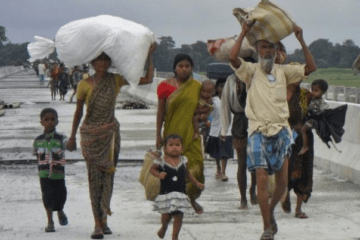
we know what it is about so let’s first know what is the issue of the problems, so let’s decode what international law is
International law: Jeremy Bentham, an English philosopher and jurist cloned the term ‘International law’ which simply means ‘the system of law ‘ that governs relations between states/nations .it can be given different names such as ‘law of nations’, ‘law amongst nations’ & ‘inter state law’
Developing countries- Those countries whose standard of living income, economic and industrial development remain more or less below average. A further downgrade takes place vis-à-vis the least developed countries of the fourth world
According to IMF, in total there are 152 countries that are considered to be developing countries with population being at currently around 6.77 billion at 85 4% it considers the whole of central of South America the whole of Africa almost all Asian countries and numerous and other island states[1][2]
Keywords
International law, world trade organization, United Nations (UN) law -enforcement
Introduction
The societal function of International law is the identical law when comes to regular law the similarities are uncanny, namely the international society of all societies law is a system of race, the society of all sections, the whole human race is divided into a system where they have laws regarding their own caste and religion, regarding laws of adoption, marriage, divorce and the faith with which the child will grow up. International serve legal relations which condition social action to serve the common interest. International law is the major legal framework for fostering and preserving colonial and Neo- colonial dominance in developing nations ..this is that essential international law principle s , such as those governing territorial acquisition , recognition state responsibility and state succession , were designed to accommodate colonialism indispensability , third world people and their countries were compelled (without their consent) to become subjects of international law by the domineering tool of international law.
International economic liberalism is one of the most potent tools of the international economic law agenda pursued by westerners through the auspicious law agenda of
international financial institutions to keep third world countries under their control and subjections-Jeremy Bentham[3][i][4]
Let’s discuss the term ‘third- world’ countries because it’s an essential element in order to describe the actual issue which is what we are about to discuss in this very paragraph, that is the ‘problems of enforcing international law ‘ in the developing countries
Third world countries:
Since 1990 the term ‘third world’ may be considered outdated, which it’s concept is mostly historical term and cannot fully address what means by developing and less -developed countries; because the prior on shows hostility and disrespect in which the third world is often characterized with stereotypes
Third world countries are normally these countries which is defined as countries with high poverty rate lack of resources and unstable financial standing.
However based on the rapid development of modernization and globalization, countries that were used to be considered as third world countries achieve big economic growth, such as Brazil, India and Indonesia which can no longer be defined by poor economic status or low GNP today
Issues:
The process of incorporating international law into domestic law is not governed by international principles in general. There is no international authority in charge of enforcing the law. States follow different process of incorporating international law into their domestic courts;
Major problems that arise while enforcing international law in India:
India’s failure to cope up with the dynamic international law: –
Though India in itself is a dynamic country that is making and taking initiatives on its own, especially since the Modi government has taken over, our dearest Prime Minister has come with a lot of dynamic schemes such, make in India made in India, that has enhanced that level of Indian domestic work it’s a Swadesh Bharat Movement 2.0. But there are bigger issues that India has been facing since 1947 which cannot be resolved in just 5-7 years, but still we have come a long way, but still India right now is a kid who is in a way to grow in a steady and rapid but systematic way so pouring too much of pressure of growth over a newly developed plant is unfair, so the exclusive dynamism of already developed countries it might collapse
- Poor law enforcement in India
Even though the current government has enrolled many laws such as GST or the removal of section 377 and it’s criminalized affect but still on ground level people still frown upon it. GST has also not established in a way it was supposed to be, there is a saying that a king is not a king without the kingdom following him, therefore any strict law that is doing too well for the totally developed countries might fails to establish its existence in under developed countries developing countries like India
1.[5]Infrequent use of International law only as an exotic device
Though international law is the essential tool for legal applications of international based statutes but the implications stand confused as in some countries as it is used for an illegal exotic weapon that is used at a vulnerable position and not implied on regular times hence it could be considered as a tool that is used as per convenience
- Lack of expert and professionals
As an Indian I can bet we are bureaucratically intelligent country every year we have more than 20,00,000 lakh aspirants for UPSC,MPSC, BPSC and more , so it’s not plausible to say we have lack of experts and professionals now, but even if we keep India at a naïve level where there is a lack of affectations that is necessary for enforcement of international tactics in a national ambience if some person has developed their own law for any other person to imply that he needs expertise training from the person who has developed it. Just put this on the same context as per the implication of western laws. It needs expert guidance.
- Lack of recognition of international law
In underdeveloped or developing countries it is practically impossible to recognise international laws and treaties as there is no supervision for such kind of law enforcement, there is no advancement by International law enforcement treaties to supervise
- Denial of the existing conflict situation
Although international treaties are made with peaceful intent but following the international law to be enforced there should be friendly and pally relationship with the other countries if two countries fail at maintaining healthy relationship with other countries international law cannot be established and it stands suspended
- Lack of public awareness
Basic people hardly know basic laws how do we expect them to know public international laws when they treat import, export, bureaucratic relationships with other countries, so public awareness, regarding other international laws will be vague
- Lack of infrastructure
This point has been elaborated since forever I will take an example if a law that is established and made for American -European relationship, internationally it cannot be implied to India-Pakistan relationship because it is not parallel when it comes to infrastructure, the transport facility, foreign, exchange system and others
- International law not mentioned clearly by the constitution drafter:
The constitution drafter was clearly ambiguous when it comes to international laws while every other law in India is well described the lines stand blur because the relationship of India is still unclear with other countries, Pakistan has always been a country that does not share amicable relationship with India but still there is a boundary of respect that India do is not cross being the stronger country that India is
- Economic and human resources development gap in India and international standards
Of Course economically India struggles hard as compared to fully developed countries so the international laws that require economic diversity India has to work harder to imply it; even the same with human resources, brain-drain has caused a lot of human resources depletion for India and certainly created a gap when it comes to enforcement of International laws
Solutions: –
With so many problems there will be much more solutions to it therefore with every international law not being established, either because of lack of expertise, lack of infrastructure, lack of human resources but there are legit solutions that will be listed below: –
- Applying existing laws as written in the constitutional law and treaty law:
If the international law and treaties are implied exactly the same way it would be easier to apply it would be a
resourceful way to carry the laws
- Citing treaties routinely
Like every system needs routine so as the legal system if some treaties are made, they need to be renewed on a regular interval on a routines basis so that the gap between policy that is made and policy that are implemented can be fixed that gap that have been arised due to time
- Signing more Treaties
As time passes the relationship between countries improve so there should be more Treaties signed between other country’s export and import should improve and foreign relationship should strengthen and world becomes a peaceful, wealthy and prosperous place to live, signing more peace treaties, trade treaties and other treaties will only and only improve the world
New legal documents such as MOU’s and MOA should take place and signed more documents to assign more work to other countries and all the facts attested before the treaties
The majority of international laws norms and regulations are likely to be aligned with the interest of those in positions of power. And as someone correctly stated, the law is only as effective as the tools of enforcement, and poor countries like India cannot respond decisively.
India, despite being a premium developing country in terms of poverty, per capita income, educations, malnutrition, hunger, farm employment, and B2C, e-commerce penetration. As a result, India is struggling to keep up with the fierce competition. In India is under constant pressure to court the world’s most powerful nations to remain competitive. All these reasons functions as a burden for India in applying International law approximately
Statute and case law:
In India, Article 51 and 253 of the constitution play a pivotal role in the enforcement of international laws. The state must respect these laws and adopt such laws in order to maintain peaceful and friendly relation with foreign countries, international organizations associations and bodies
- National legal services authority V. union of India: in this case supreme court held that parliamentary approvals are necessary for treaties which infringe the right of the citizen or which require change in the domestic law of the state. International law forms part of domestic law except where there is inconsistency with the provision of domestic law
- Keshvananda Bharti V. State of Kerala.
Hon’ble chief Justice Sikri in this case said that in situation where the language of municipal law is not clear or contrary then the support of international law must be taken. Article 253 gives power to the parliament of our country to make laws for giving effect to international treaties and conventions
- Vishaka V. state of Rajasthan
In this case of sexual harassment of women at workplace, the court used international law to find the meaning of domestic law and also held that international law, which consistent to it should be taken in to consideration for enlarging the meaning and content of the domestic law
- Krishna Sharma V. state of West Bengal
In this case the Calcutta High Court stated in 1954 that in case of dispute between international law and domestic law, courts should restore harmony in the two and must examine interpretations of international instruments including treaties, conventions and declarations
Conclusion:
In theory, the recognised principles of Independence, sovereignty, and territorial bounds preserve state equality but in practice. George orwells oxymoronic remark that ‘all animals are equal, but some are more equal than others’ is appropriate to illustrate the strength of states in their interactions with one another. International law is frequently shaped and written in a way that benefits spy fix groups or governments
Apart from the fact that international law is most influential when it favours the powerful, the powerful are frequently the source of law. There is nothing incorrect with asserting that international law is based in the principles of ‘ might makes right’. Many have suggested that international laws and standards are nothing more that power mirrors international law arose from a specific socio-political context in which power and resources were unequally distributed. Further ore the five permanent members of the United Nations, security councils (UNSC), namely the United States (US) the United Kingdom (UK), France, China and the Russian federation, have veto rights, implying that these five permanent members are above international law and hence immune
Now that we know the problems and we know the solutions also to some extent it makes us assured that with every problem there is a solution whether in life or in legal world , the legal world runs on loopholes it makes us realise that international laws has some boundaries in Developing countries because developing countries have not reached the level of human resource development , Infrastructure , currency building and foreign relations , because we have our limitations but that does not restrict us from becoming the fastest developing country in the entire globe , the global system hails down to the growth level India has achieved in these few years [ii][iii]
[1] Enforcing International Law | ASIL
THE PROBLEM OF ENFORCING INTERNATIONAL LAW ON DEVELOPING COUNTRY
International Law and Developing Countries – Brill
Intellectual property rights and law enforcement in developing countries
[2] Jeremy Bentham, Principles of International Law (1786-1789/1843)
[3]International law | Definition, History, Characteristics, Examples …Philosophy of International Law – Stanford Encyclopedia of Philosophy
Jeremy Bentham, Principles of International Law (1786-1789/1843)
[4]Jeremy Bentham, Principles of International Law (1786-1789/1843)Intellectual property rights and law enforcement in developing countries
[5]Countries Contemporary Recent
International Law, the International Development Legal Regime and …Objects of International Law., Jeremy Bentham, The Principles of …
“International Law, the International Development Legal Regime and ….” https://ideas.repec.org/a/bpj/lawdev/v7y2014i1p33n5.html.
International law | Definition, History, Characteristics, Examples …
Objects of International Law., Jeremy Bentham, The Principles of …
International Law, the International Development Legal Regime and …
Implementing international law | International Law: A Very Short …“
The role of international case law in implementing the obligation not ….” 06 Oct. 2020, https://link.springer.com/article/10.1007/s10784-020-09503-6.
“National Legal Ser.Auth vs Union Of India & Ors on 15 April, 2014.” 15 Apr. 2014, https://indiankanoon.org/doc/193543132/.
“India Law Research – India Law Research – Harvard Library Guides.” 07 Jul. 2023, https://guides.library.harvard.edu/law/indian-law-research.
Legal advice online from lawyers – Indian Kaanoon




0 Comments